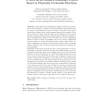Free Online Productivity Tools
i2Speak
i2Symbol
i2OCR
iTex2Img
iWeb2Print
iWeb2Shot
i2Type
iPdf2Split
iPdf2Merge
i2Bopomofo
i2Arabic
i2Style
i2Image
i2PDF
iLatex2Rtf
Sci2ools
145
click to vote
IACR
2011
2011
A Novel RFID Distance Bounding Protocol Based on Physically Unclonable Functions
Abstract. Radio Frequency Identification (RFID) systems are vulnerable to relay attacks (i.e., mafia, terrorist and distance frauds) when they are used for authentication purposes. Distance bounding protocols are particularly designed as a countermeasure against these attacks. These protocols aim to ensure that the tags are in a distant area by measuring the round-trip delays during a rapid challenge-response exchange of short authenticated messages. Terrorist fraud is the most challenging attack to avoid, because a legitimate user (a tag owner) collaborates with an attacker to defeat the authentication system. Many RFID distance bounding protocols have been proposed recently, with encouraging results. However, none of them provides the ideal security against the terrorist fraud. Motivated by this need, we first introduce a strong adversary model for Physically Unclonable Functions (PUFs) based authentication protocol in which the adversary has access to volatile memory of the tag. ...
Related Content
| Added | 23 Dec 2011 |
| Updated | 23 Dec 2011 |
| Type | Journal |
| Year | 2011 |
| Where | IACR |
| Authors | Süleyman Kardas, Mehmet Sabir Kiraz, Muhammed Ali Bingöl, Hüseyin Demirci |
Comments (0)

